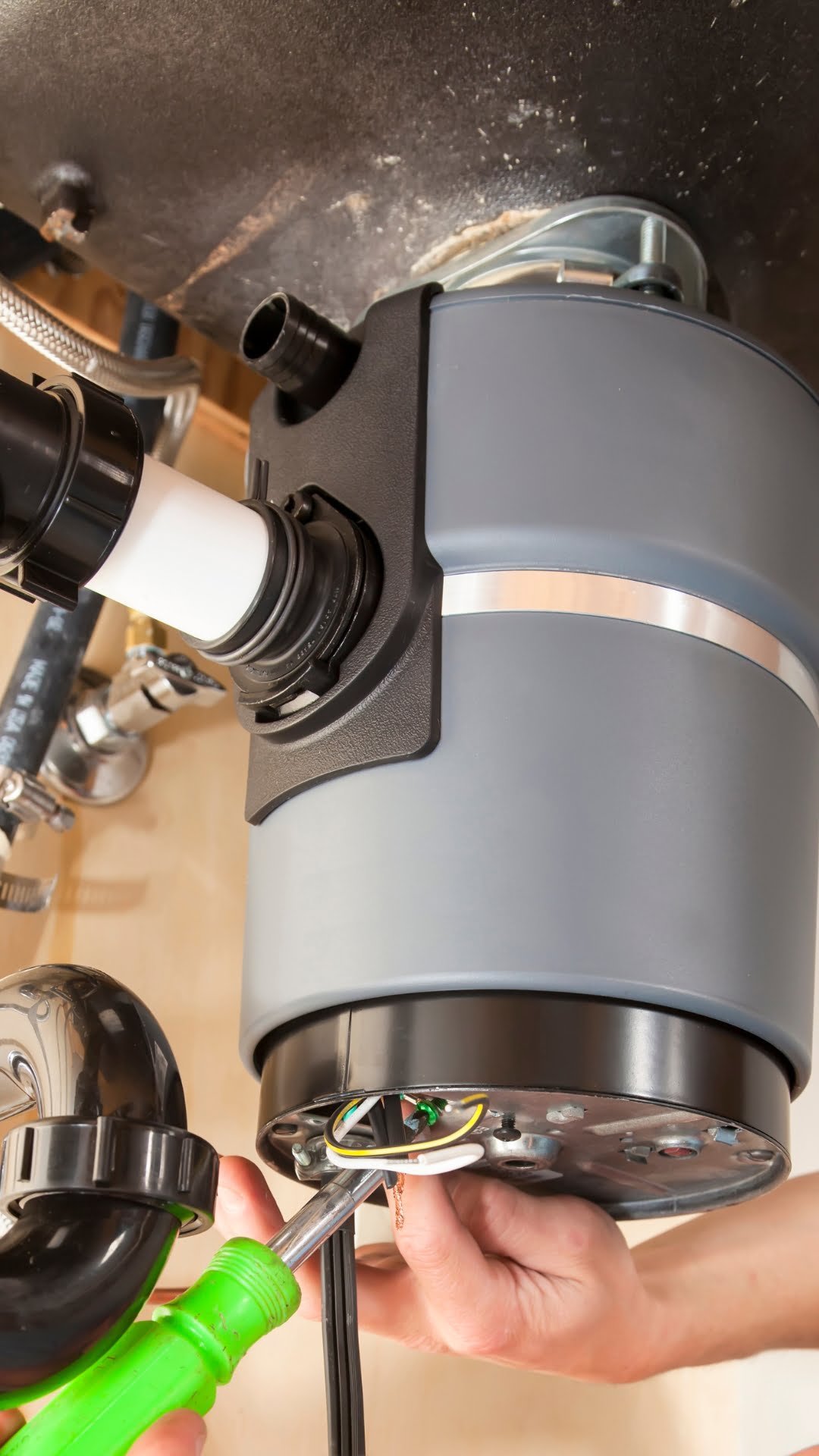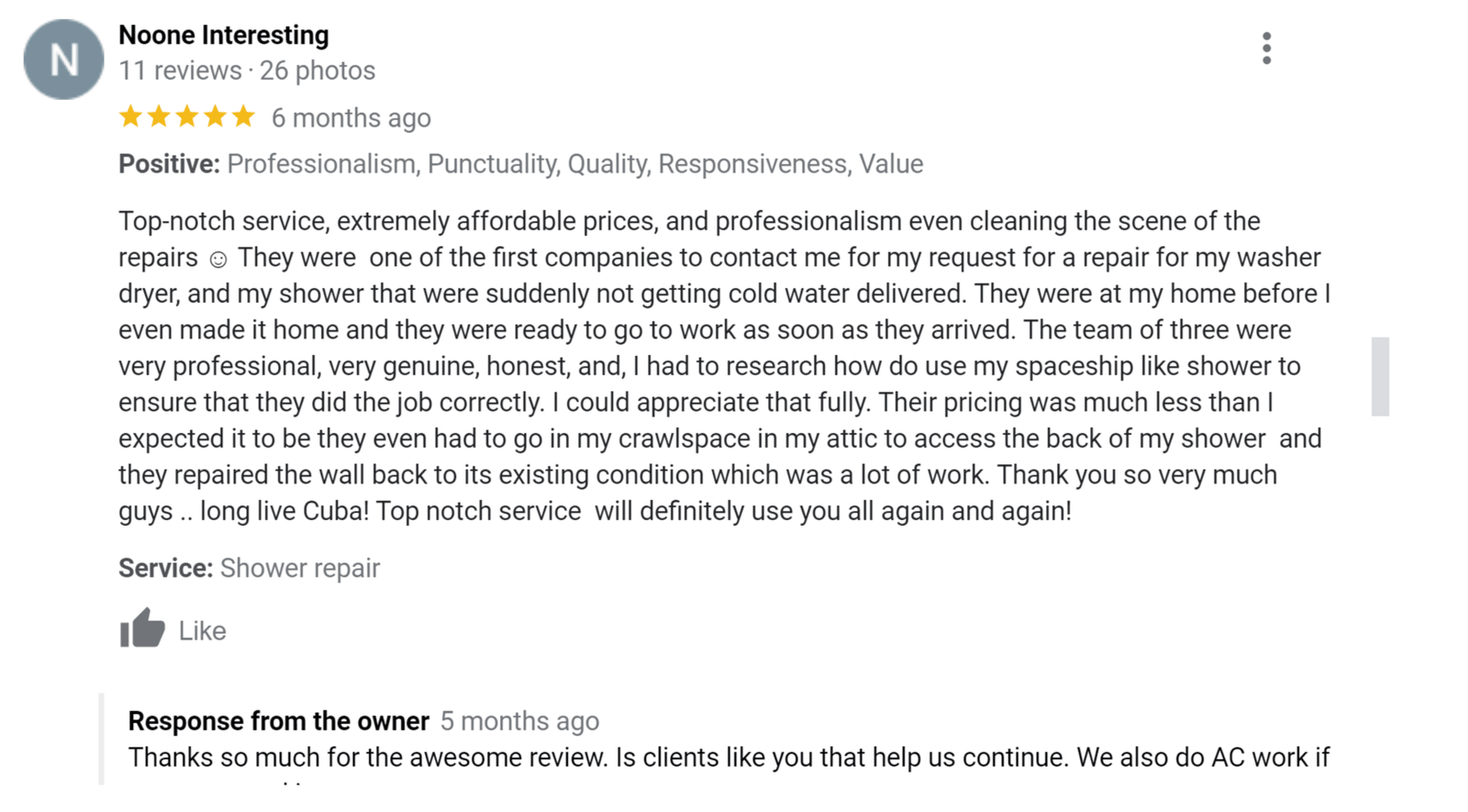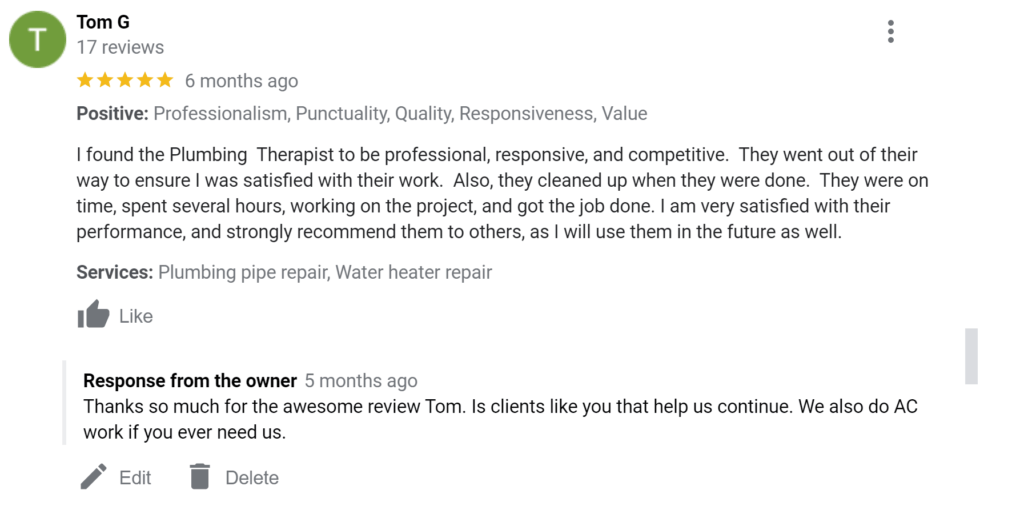Garbage Disposal Repair
Having garbage disposal problems? Trust Plumbing Therapist for quick and reliable repairs. Our experts gets your kitchen back to normal in no time.
Do You Need Our Help ?
Feel free to contact us now
$99 Water Heater Flush + Free Plumbing System Inspection
Garbage Disposal Repair in Tampa Bay
Reliable & Effective Garbage Disposal Repair Services in Hillsborough County, Pinellas County, and Pasco County
Is your garbage disposal acting up, making strange noises, or simply not working? Don’t let a faulty unit disrupt your kitchen activities. At Plumbing Therapist, we provide quick, reliable garbage disposal repair services in the Tampa Bay area. Our team of certified plumbing professionals is equipped to diagnose and fix a variety of disposal issues, restoring your kitchen to its optimal functionality.
Why Choose Plumbing Therapist for Garbage Disposal Repair?
Speedy Service: We understand how disruptive a malfunctioning garbage disposal can be. Our team is committed to resolving your issues as quickly as possible.
Expert Technicians: Our technicians are trained to handle a wide range of garbage disposal problems. They arrive equipped with the latest tools and parts to perform effective repairs.
Quality Guaranteed: Our repairs are designed to last, ensuring you won’t face the same issue anytime soon.
Common Garbage Disposal Issues We Handle:
- Jammed or clogged disposal units
- Strange noises
- Leaking disposal
- Overheating or electrical issues
- Inconsistent or incomplete grinding
How Our Process Works
- Diagnosis: We start by assessing the issue to determine the most effective repair strategy.
- Quotation: We provide a transparent pricing quote before beginning any work.
- Repair: Our skilled technicians perform the necessary repairs, ensuring your unit is up and running.
- Final Checks: Before leaving, we test the unit to make sure it’s working flawlessly.
Schedule Your Garbage Disposal Repair Today!
Don’t let a broken garbage disposal disrupt your daily routine. Call Plumbing Therapist today to schedule your repair service. Your satisfaction is our top priority.

Why partner with Plumbing Therapist?
Quality, Affordability, and Expertise.

No Hidden or Unexpected Charges

Free Estimates & Online Booking Available

Professionally Trained Technicians

Honesty is Guaranteed

Quick Communication & Service Within 24 Hours

400+ 5 Star Reviews

Why does your garbage disposal need to be repaired?
Repairing a malfunctioning garbage disposal is essential for several reasons:
Hygiene and Sanitation: A faulty garbage disposal can lead to the accumulation of food waste, resulting in foul odors and attracting pests. This can pose health risks.
Plumbing Issues: An improperly functioning garbage disposal can cause water to back up into the sink, potentially leading to more significant plumbing problems like leaks or clogs in the pipes.
Operational Efficiency: A smoothly operating garbage disposal helps you manage kitchen waste more efficiently, saving time and effort in cleaning up.
Cost Savings: Fixing minor issues early on can prevent more extensive and expensive repairs down the line, prolonging the life of the unit.
Environmental Benefit: Efficiently functioning garbage disposals grind waste into small particles that are more easily processed at wastewater treatment plants, reducing landfill waste.
Safety: A malfunctioning unit can be hazardous. It may lead to electrical issues or even pose a risk of injury if someone tries to fix it without proper knowledge.
Home Value: Well-maintained appliances, including a garbage disposal, can enhance the overall value and functionality of your home.
Convenience: A working garbage disposal makes kitchen tasks like dishwashing and cooking prep more straightforward and convenient.
For these reasons, it’s advisable to repair your garbage disposal as soon as you notice any issues.
If you would like more information, feel free to give them a call at (813)-437-4477 or you can book online and get their latest discount!
Customer Testimonials: Real Experiences with Plumbing Therapist
We proudly share the experiences and stories of our valued clients. Their feedback provides a glimpse into the quality of service and commitment to excellence we uphold at Plumbing Therapist. You'll read firsthand how our plumbing solutions have improved comfort and efficiency in homes across Tampa Bay. These testimonials illustrate our dedication to customer satisfaction and the difference our expert services can make.




Your questions answered
Common Main Keyword Questions:
Why is my garbage disposal not working at all?
If your garbage disposal is not working at all, several factors could be responsible. Here are some common reasons and troubleshooting steps:
1. Power Issue:
- Solution: Check if the unit is plugged in and whether the electrical outlet is functioning. You can also check the circuit breaker to ensure it hasn’t tripped.
2. Overheating:
- Symptom: The disposal motor may have shut off due to overheating.
- Solution: Press the reset button usually located at the bottom of the disposal unit.
3. Internal Jam:
- Symptom: The blades are jammed and can’t spin.
- Solution: Unplug the unit and manually rotate the blades using an Allen wrench in the slot at the bottom of the unit. Remove any obstructions.
4. Faulty Switch:
- Symptom: The wall switch that operates the disposal might be defective.
- Solution: Test the switch or replace it if necessary.
5. Damaged Motor:
- Symptom: If there is power and the unit still won’t turn on, the motor may be damaged.
- Solution: In such cases, professional repair or replacement is usually required.
6. Wiring Issues:
- Symptom: Improper or loose wiring can also cause the unit to not work.
- Solution: Ensure all electrical connections are secure. If you’re not comfortable with electrical work, call a professional.
7. GFCI Outlet:
- Symptom: Sometimes, garbage disposals are plugged into GFCI outlets which can trip.
- Solution: Reset the GFCI outlet by pressing the reset button.
If you’ve tried the above steps and the issue persists, it might be time to call in a professional for a thorough diagnosis and repair. It’s crucial to always prioritize safety; if you’re not comfortable attempting these troubleshooting steps, seek professional assistance.
Why is my garbage disposal making strange noises?
If your garbage disposal is making strange noises, there could be several reasons behind it. Here’s a breakdown of some common causes and how to address them:
1. Foreign Object:
- Symptom: A loud clanging or rattling noise.
- Solution: Turn off the disposal and unplug it. Use tongs or pliers to carefully remove any foreign objects like silverware or hard pieces of bone.
2. Dull or Damaged Blades:
- Symptom: A metal-on-metal grinding sound.
- Solution: If the blades are damaged, they may need to be replaced. In some cases, running ice cubes and rock salt through the disposal can help “sharpen” the blades.
3. Loose Components:
- Symptom: A rattling noise that doesn’t seem to be caused by a foreign object.
- Solution: Turn off and unplug the unit, then check for any loose screws or mounting bolts and tighten them.
4. Motor Issues:
- Symptom: Humming or a low whirring sound without blade movement.
- Solution: This could indicate a jam or a motor problem. Try the reset button and manually turning the blades. If that doesn’t work, professional repair may be needed.
5. Drain Blockage:
- Symptom: A gurgling sound.
- Solution: This could be due to a clog in the drainpipe. You might need to clean the drain or use a drain cleaner.
6. Worn Bearings or Motor:
- Symptom: Squealing or high-pitched noise.
- Solution: This typically indicates a worn-out bearing or motor, which usually requires professional replacement.
7. Misaligned Components:
- Symptom: Irregular or new noises not present before.
- Solution: Sometimes, components can become misaligned after long-term use or a repair job. Readjusting or tightening these components can solve the issue.
If you’re not comfortable addressing these issues yourself or if the problem persists after you’ve tried troubleshooting, it’s a good idea to call a professional for diagnosis and repair.
Can I fix a jammed garbage disposal myself?
Yes, you can often fix a jammed garbage disposal yourself, but it’s crucial to prioritize safety while doing so. Here’s how to go about it:
Safety First
- Turn Off the Power: Make sure to switch off the garbage disposal at the wall switch and unplug it from the electrical outlet.
- Avoid Using Hands: Never put your hands into the garbage disposal to remove jams, even if the power is off. Use tongs or pliers instead.
Steps to Fix a Jam
Inspect for Obstructions: Use a flashlight to look for any visible obstructions causing the jam. If you find any, use tongs or pliers to carefully remove them.
Manual Rotation: Most disposals have a manual hex hole at the bottom that fits an Allen wrench. Insert the wrench into the hole and move it back and forth to manually rotate the blades. This can help free minor jams.
Reset Button: After removing the jam, press the reset button on the bottom of the unit. This resets the internal breaker after a jam.
Test: Plug the unit back in, turn on the water, and then turn on the disposal to test it. If it’s still not working properly, you may need to repeat the above steps or seek professional help.
When to Call a Professional
- Persistent Jams: If you’ve tried the above steps and the jam persists, you may need to call a professional.
- Strange Noises: If the unit makes unusual noises after you’ve cleared the jam, this could indicate a more serious issue.
- Leaking or Electrical Issues: If you notice any leaks or electrical problems, it’s best to consult a professional.
By following these steps, you can often fix a jammed garbage disposal yourself. However, if the problem persists or you’re not comfortable performing these tasks, it’s wise to call in professional help.
Is it leaking? How do I fix it?
If your garbage disposal is leaking, the location of the leak can give you a clue as to what the issue might be. Here are some common leak locations and how to address them:
1. Top of the Disposal (Sink Flange)
- Symptom: Water leaks when the sink is filled.
- Solution: The sink flange might be loose or the plumber’s putty may have failed. You’ll need to disassemble the flange and reseal it.
2. Side Connections
- Symptom: Leaks from the side where the disposal is connected to the dishwasher or drain pipe.
- Solution: Tighten the hose clamps or replace the hose if damaged.
3. Bottom of the Disposal
- Symptom: Water dripping from the bottom of the unit.
- Solution: This usually indicates a more serious internal issue with the disposal, like a failing seal, which often requires professional repair or replacement.
4. Reset Button or Cover Plate
- Symptom: Leaking around the reset button or cover plate.
- Solution: These areas should not leak and usually indicate a seal or gasket problem within the unit. Professional repair or replacement is often needed.
General Steps to Fix a Leak
- Identify the Leak Source: Run water and observe where the leak is coming from.
- Turn Off Power: Make sure the disposal is turned off and unplugged for safety.
- Tighten Connections: Use a wrench to tighten any loose bolts or hose clamps.
- Replace Seals or Gaskets: If tightening doesn’t solve the issue, you may need to replace worn-out seals or gaskets.
- Check for Cracks: Sometimes the leak is due to a cracked disposal housing, which requires replacement.
Safety Precautions
- Electricity and Water Don’t Mix: Always unplug the unit and turn off the power before working on it.
- Use the Right Tools: Use a wrench or pliers to tighten connections and bolts; don’t overtighten, as this can cause cracks.
- Test Carefully: After you think you’ve fixed the leak, run water through the disposal while it’s off to see if the leak has stopped. If it has, plug it back in and test again with the unit on.
If you’ve tried these steps and the issue persists, or if you’re uncomfortable performing these tasks, it may be best to call a professional for diagnosis and repair.
How often should a garbage disposal be serviced?
The frequency of garbage disposal servicing depends on various factors like the age of the unit, how heavily it’s used, and the type of waste it usually handles. However, here are some general guidelines:
Regular Maintenance
- Self-Checks: Performing regular self-checks, like listening for unusual noises, can help catch issues before they become serious problems.
- Monthly Cleaning: At least once a month, consider cleaning the disposal by grinding ice cubes and lemon or orange peels to clear out debris and eliminate odors.
Professional Servicing
- Initial Years: During the first few years of a garbage disposal’s life, it may not require professional servicing unless there’s a specific issue like jamming, unusual noises, or leaks.
- After 5 Years: As the unit ages beyond 5 years, consider having it professionally inspected annually, especially if it’s a lower-end model. This can help extend its lifespan and identify issues before they become major problems.
- Signs of Trouble: If you experience frequent jams, leaks, or bad odors, it may be wise to have the unit professionally serviced.
Maintenance Plans
Some companies offer maintenance plans that include regular inspections and servicing. These plans can be a convenient way to ensure your disposal remains in good working condition.
Extending the Life of the Unit
Regular maintenance can significantly extend the life of your garbage disposal. Here are some tips:
- Avoid putting hard or fibrous waste into the disposal.
- Run cold water while using the disposal and for about 15 seconds after you turn it off.
- Use dish soap and cold water to periodically clean the unit.
By adhering to a regular maintenance schedule, you can help ensure that your garbage disposal runs efficiently for many years. However, even with the best care, all garbage disposals eventually wear out and will need to be replaced.
Can I sharpen the blades of my garbage disposal?
While you can’t technically “sharpen” the blades of a garbage disposal—the blades are not designed to be razor-sharp to begin with—you can clean and maintain them to improve their grinding efficiency. Over time, grease and food particles can accumulate on the blades, making them less effective.
DIY Methods to Clean and “Sharpen” Garbage Disposal Blades
Here are some home remedies you can try to clean the blades and help them function more efficiently:
1. Ice Cubes and Rock Salt
- How to Do It: Fill the garbage disposal with ice cubes and then add a cup of rock salt. Turn on the disposal while running cold water. The ice and salt will create an abrasive action that can help clean off any grime or buildup on the blades.
2. Ice Cubes and Lemon/Vinegar
- How to Do It: Fill the disposal with ice cubes and add some lemon peels or a cup of white vinegar. Run the disposal with cold water. The ice will help clean the blades, and the lemon/vinegar will help eliminate odors.
3. Baking Soda and Vinegar
- How to Do It: Pour half a cup of baking soda into the disposal followed by a cup of white vinegar. Allow the mixture to fizz and sit for a few minutes. Then run cold water and operate the disposal to clean the blades.
Safety Precautions
- Always Unplug the Unit: Before doing any maintenance, make sure to unplug the garbage disposal to ensure your safety.
- Never Use Your Hands: Never put your hands inside the garbage disposal, even when it’s turned off. Always use tools like tongs or pliers to remove any objects.
When to Consult a Professional
If you notice that your garbage disposal is continually ineffective, makes unusual noises, or shows signs of wear and tear, it might be time for professional maintenance or even replacement. Regular maintenance will help extend the life of your unit, but all disposals will eventually wear out and need to be replaced.

